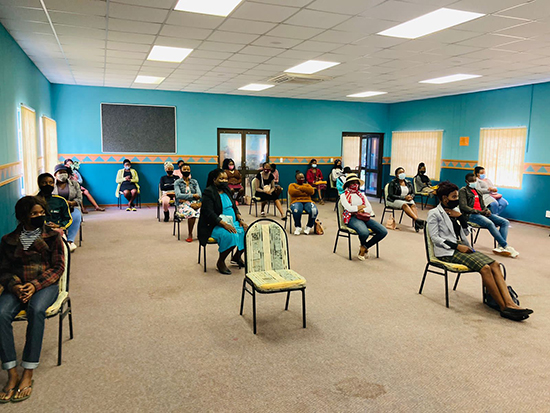News & Events
Engaged psychology for calamitous times
On Friday, 15 October 2021, the Department of Psychology hosted a webinar that was aimed at initiating a dialogue for future collaborative community-engaged projects. The webinar was presented by Dr Genevieve James, Deputy Director of the Community Engagement and Outreach Division at Unisa.
The Department of Psychology has noted that the phenomenon of interdisciplinary, community-engaged research is becoming an integral function of the academic endeavour. It is through this important realisation that it became necessary to host a discussion with the primary focus on sharing and reiterating the importance of engaged scholarship, as well as encouraging and instilling an out-of-the-box style of thinking for the Department of Psychology with regard to collaborating with other disciplines, to develop projects that are efficient, productive and engaged.

Dr Genevieve James, Deputy Director: Community Engagement and Outreach Division
Unisa as an engaged university
James began the conversation by stating that Unisa has positioned itself as an engaged university, which means that the university is involved in the work of collaborative knowledge creation, application and mobilisation. It is a university that sets its intellectual gifts and talents in the direction of the needs of our world. It exists within communities, and not in isolation, and it is engaged internally and externally. She noted that Unisa is “involved in the work of creating knowledge, in collaboration and dialogue with our critical dialogue partners, the government, professional bodies and civil society, including academics from various disciplines within the university”. James added that the university needs to make sure that, in this robust engagement, in and outside of the university, the institution is learning from these networks and that our networks benefit from the knowledge created in higher education.
James noted that the world is currently undergoing a difficult time of calamity. She made this observation by reflecting on the myriad challenges that are confronting communities, for example, the demonstrations that took place in KZN and Gauteng in July this year, the high levels of violence and the global pandemic, to name a few. She stated that during times of calamity, we are required to take a momentary pause, to think about how we can transform, first, ourselves and, then, the academy, to re-assess our priorities.
James expressed significant concern about the number of learning needs that communities have, among which she amplified the learning needs around mental health. She indicated that communities are in dire need of a great deal of training on understanding behaviour, and on understanding the response and reaction to environmental factors. She suggested that we need mental health experts and professionals in the field of psychology to form part of municipality councils, as well as the executive of national government departments, where they can apply their skills at that very conception stage of socio-economic solutions for society.
Moving from an ivory tower to a fully engaged university
James described the ivory tower concept as applying to organisations that are isolated, who position themselves as higher than the rest of society and who also maintain a safe distance. She went on to say that a fully engaged university moves away from isolation and thinks in the community. James is of the view that the psychology professionals and scholars are suitably equipped to work and think in the community, to network with stakeholders and engage at the coalface, and to build high-quality relationships and partnerships for joint action that can yield joint benefits.
What kind of psyche do we need to develop such a community?
James recommended that we should start talking to each other across disciplines and various areas of expertise, to look for synergies and, as we go further in our engaged scholarship journey, completely breaking down those thick walls that separate us, and interact, not only with each other within the university, but also across government, business, civil society, faith-based communities and communities in different settlement types. She believes that this kind of thinking will transform the scholarship and further assist scholars to discover the joys of involving different, distinct academic disciplines in an approach to a research problem towards an interdisciplinary kind of research activity.

Training session at the Mbazwana Community Centre
Inter-/Multidisciplinary project in the department
The Department of Psychology and the Department of Information Science are involved in an inter-/multidisciplinary collaboration on a community engagement project named The Computer and Information Literacy Project. The project offers computer literacy training, which is carried out by the Department of Information Science, and it includes mentorship and career guidance, which is offered by the Department of Psychology.
In response to James’s presentation, Dr Fortunate Silinda, who is a member of the project, indicated to colleagues that the project is targeted towards the “Not in Education, Employment and Training” (NEET) group, which comprises mostly youth and those in rural areas. For most of the individuals in the target group, their first encounter with computers is through this project. Furthermore, through the project, it was discovered that most of the trainees lacked career-related knowledge, so the Department of Psychology assisted by organising mentoring for them.
The project team travelled to the Mbazwana Education Centre in September 2021 to facilitate the “Train the Trainer” workshop for the team at this centre, which is led by the manager, Dr Mdletshe. The project team facilitated sessions that sought to equip candidates on how to facilitate the computer literacy project, and also to orientate the new cohort of computer and career guidance trainees on the project. The Department of Psychology, through Silinda, conducted a needs analysis on youth career needs, to ensure that they work towards solutions that are based on their identified needs.
* By Katlego Pilane, Department of Psychology
Publish date: 2021-11-17 00:00:00.0

